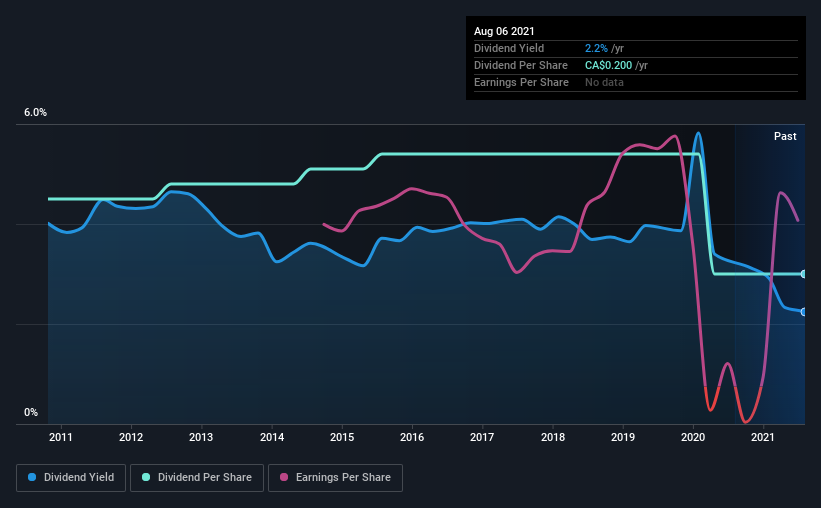The board of Accord Financial Corp. (TSE:ACD) has announced that it will pay a dividend of CA$0.05 per share on the 1st of September. Based on this payment, the dividend yield on the company's stock will be 2.2%, which is an attractive boost to shareholder returns.
See our latest analysis for Accord Financial
Accord Financial's Earnings Easily Cover the Distributions
A big dividend yield for a few years doesn't mean much if it can't be sustained. However, prior to this announcement, Accord Financial's dividend was comfortably covered by both cash flow and earnings. This means that most of what the business earns is being used to help it grow.
Unless the company can turn things around, EPS could fall by 2.6% over the next year. If the dividend continues along the path it has been on recently, we estimate the payout ratio could be 22%, which is definitely feasible to continue.

Dividend Volatility
Although the company has a long dividend history, it has been cut at least once in the last 10 years. The dividend has gone from CA$0.30 in 2011 to the most recent annual payment of CA$0.20. The dividend has shrunk at around 4.0% a year during that period. A company that decreases its dividend over time generally isn't what we are looking for.
Dividend Growth May Be Hard To Achieve
With a relatively unstable dividend, it's even more important to evaluate if earnings per share is growing, which could point to a growing dividend in the future. In the last five years, Accord Financial's earnings per share has shrunk at approximately 2.6% per annum. If earnings continue declining, the company may have to make the difficult choice of reducing the dividend or even stopping it completely - the opposite of dividend growth.
In Summary
In summary, while it's good to see that the dividend hasn't been cut, we are a bit cautious about Accord Financial's payments, as there could be some issues with sustaining them into the future. The company is generating plenty of cash, which could maintain the dividend for a while, but the track record hasn't been great. This company is not in the top tier of income providing stocks.
Investors generally tend to favour companies with a consistent, stable dividend policy as opposed to those operating an irregular one. Still, investors need to consider a host of other factors, apart from dividend payments, when analysing a company. For example, we've identified 5 warning signs for Accord Financial (2 don't sit too well with us!) that you should be aware of before investing. Looking for more high-yielding dividend ideas? Try our curated list of strong dividend payers.
When trading stocks or any other investment, use the platform considered by many to be the Professional's Gateway to the Worlds Market, Interactive Brokers. You get the lowest-cost* trading on stocks, options, futures, forex, bonds and funds worldwide from a single integrated account. Promoted
New: Manage All Your Stock Portfolios in One Place
We've created the ultimate portfolio companion for stock investors, and it's free.
• Connect an unlimited number of Portfolios and see your total in one currency
• Be alerted to new Warning Signs or Risks via email or mobile
• Track the Fair Value of your stocks
This article by Simply Wall St is general in nature. It does not constitute a recommendation to buy or sell any stock, and does not take account of your objectives, or your financial situation. We aim to bring you long-term focused analysis driven by fundamental data. Note that our analysis may not factor in the latest price-sensitive company announcements or qualitative material. Simply Wall St has no position in any stocks mentioned.
*Interactive Brokers Rated Lowest Cost Broker by StockBrokers.com Annual Online Review 2020
Have feedback on this article? Concerned about the content? Get in touch with us directly. Alternatively, email editorial-team (at) simplywallst.com.
About TSX:ACD
Accord Financial
Through its subsidiaries, provides asset-based financial services to industrial and commercial enterprises primarily in Canada and the United States.
Low risk and slightly overvalued.
Market Insights
Weekly Picks


Crazy Undervalued 42 Baggers Silver Play (Active & Running Mine)


Fiducian: Compliance Clouds or Value Opportunity?

Willamette Valley Vineyards (WVVI): Not-So-Great Value
Recently Updated Narratives

SLI is share to watch next 5 years


The "Molecular Pencil": Why Beam's Technology is Built to Win

PRME remains a long shot but publication in the New England Journal of Medicine helps.
Popular Narratives


MicroVision will explode future revenue by 380.37% with a vision towards success


NVDA: Expanding AI Demand Will Drive Major Data Center Investments Through 2026




